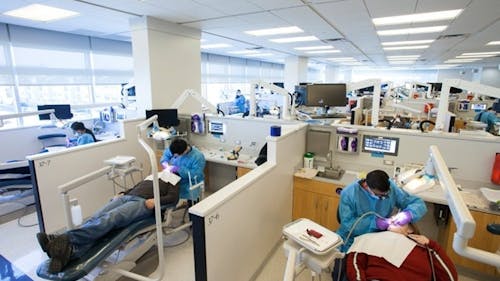Rutgers receives $11.7 to conduct research comparing opioids to non-narcotics after dental surgery

The National Institutes of Health (NIH) recently announced that Rutgers had been awarded $11.7 million to head a collaborative project with four other universities to compare non-narcotic pain medicines with opioids after dental surgery, according to WHYY-FM.
The study will also look into how these treatments impact the potential for addiction, how gender differences influence treatment and the side effects of each treatment, as well as how they impact the overall quality of life.
For the study, Rutgers will be recruiting approximately 1,800 patients from its own dental program in Newark, as well as similar programs at other universities participating in the study. The patients will be undergoing molar extractions, which commonly need pain medication prescriptions afterward.
Half of the group will be prescribed with hydrocodone, an opioid and one of the most common medicines in oral surgery. The other half will receive acetaminophen and ibuprofen, which are not opioids and can be obtained without a prescription.
Cecile Feldman, the principal investigator of the study and dean of Rutgers School of Dental Medicine, said dental clinics are the most ideal settings for the study because oral surgeons prescribe opioids fairly often.
“A large part of our job is managing acute and chronic pain," she said. “We’re very hopeful that the results of our research could significantly reduce America’s epidemic levels of opioid abuse while still providing relief for pain.”
Opioid addiction has led to more than 3,000 deaths last year. Every year, tens of thousands of drug users seek treatment for addiction, but many are unable to have access to services.
An analysis from 10 years ago of approximately 80 million opioid prescriptions found that dentists ranked third (after primary care doctors and internists) for highest rate of opiate prescribing. They write 8% of total scripts among the general public, according to the article.
When it comes to young patients, between the ages of 10 and 19, dentists rank first, giving opioid scripts to nearly a third of patients at this age.
Feldman said this high rate is due to the fact that wisdom teeth usually emerge when people are in their late teens or early 20s. Since dental pain is typically “excruciating and unrelenting ... You will do anything to try and stop it. You can’t eat, you can’t sleep, you can’t function. It is all-consuming," she said.
Preliminary studies have shown that patients who received acetaminophen, also known as Tylenol, and ibuprofen were able to control their pain, but received fewer side effects than opioids.
The hope for the new study is that it will provide enough evidence for practitioners to be confident in prescribing non-opioids over opioids, Feldman said.
“The pain isn’t the only thing you need to take into consideration," she said. “People will put up with a slightly higher level of pain if they can avoid side effects and have a higher quality of life during the recovery period."
The trial will occur sometime in the next few years, and has also been designed to mimic the practice of real dental work, which has not been observed in previous research. Researchers will look at both groups of patients in the study for up to seven days after their procedure, recording how the medications worked to help their pain and whether there were any side effects.
“We want, as much as possible, to duplicate real life conditions in the clinic," Feldman said.
Researchers will also follow patients to see if anyone who received opioids was more likely to abuse these drugs in the future. The funding from the NIH will pay for six years of preparations, study and analysis.
Besides Rutgers, there will be related research at the University of Illinois at Chicago, the University of Michigan, the University of Maryland, Baltimore and the University of Rochester. Each of these programs will be serving a different population of patients, which will give the study an overall wider scope and applicability, Feldman said.



